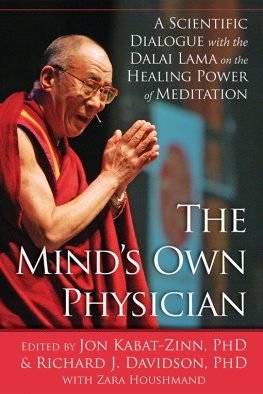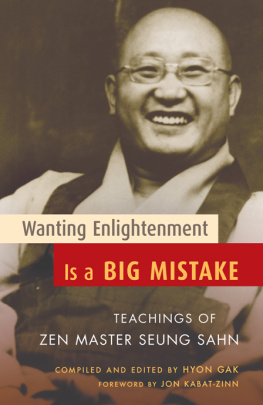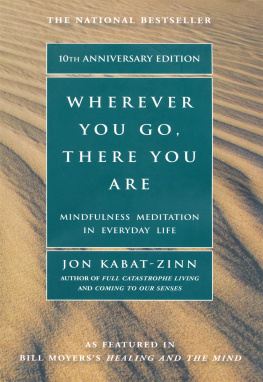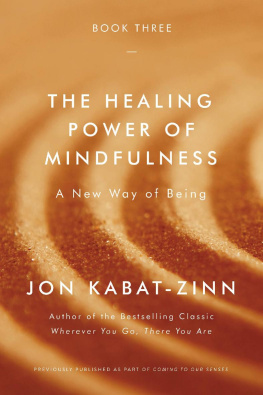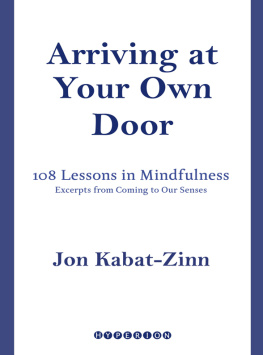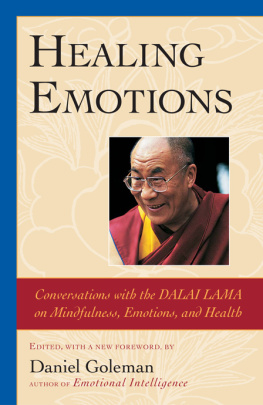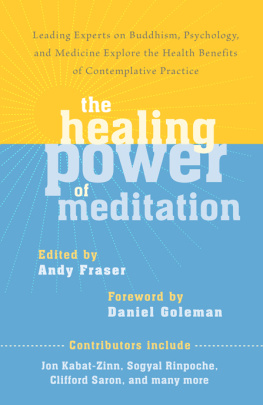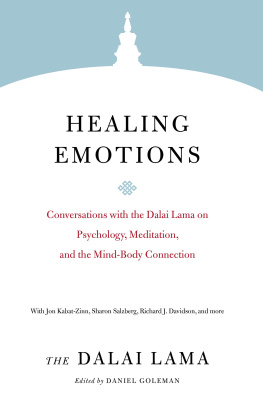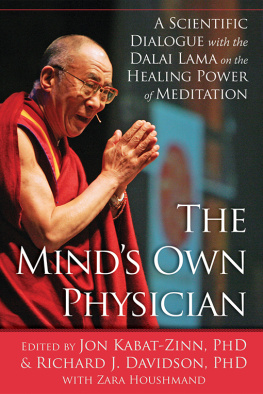
The Minds Own Physician is a journey of understanding, in which an integrative dialogue unfolds between the spiritual leaders of contemplative meditation and scientists at the forefront of mind-body medicine. This transformative conversation provides valuable insight into how meditative practices can balance the mind with effects on the body, as well as, potential benefits for human health. This blending of contemplative traditions with Western science opens a mindful awareness that has the empowering capacity to fully engage people in their health, and more broadly, in the well-being of our societies.
Michael R. Irwin, MD, Cousins Professor of Psychiatry and Biobehavioral Sciences, David Geffen School of Medicine, University of California, Los Angeles
The Minds Own Physician offers us a precious portal into the seminal conversations that gave birth to the nascent field of contemplative neuroscience. The issues digested, debated, and ignited in its pages will serve as a road map and inspiration for my students and their students over the coming decades.
Amishi P. Jha, PhD, contemplative neuroscientist, Associate Professor of Psychology, University of Miami
If you want to see how to build bridges between the deepest wisdom of the heart and the highest standards of contemporary neuroscience, look no further. This series of meetings between His Holiness the Dalai Lama and Western scientists and meditation teachers will prove to be epoch-changing, and this book shows why. Here, you will find interior and exterior empiricism in exquisite dialogue. Drink it all in. The brilliance of the participants shines through on every page.
Mark Williams, PhD, Professor of Clinical Psychology, University of Oxford, Director, Oxford Mindfulness Centre
Can meditation improve your health? This question is just the starting point for a series of innovative exchanges across different ways of knowing among first-ranked clinicians, scientists, Buddhist teachers, and the Dalai Lama. Thoughtful, rigorous, and surprising by turns, this dialogue reminds all of us who care about the effects of the mind on health just how much more thinking remains to be done.
Anne Harrington, PhD, Professor of the History of Science, Harvard University, author of The Cure Within
Our thoughts can seem too real, giving our imaginings about tomorrow the power to create chronic stress and unhealthy changes in our bodies. Our sense of self can seem too fixed, creating a cage where our habitual worries can run in depressing circles. In the moment that we recognize our thoughts as thoughts and our habits as habits, new and liberating possibilities emerge for the way we live our lives. Contemplative traditions such as Buddhism have long seen the transformative power of that simple moment of recognition, and more recently, clinicians in various domains have discovered the potential that this contemplative insight offers for the treatment of chronic stress, depression, and other especially modern maladies. Yet the potential of interventions based on contemplative approaches has only begun to emerge. The full realization of that potential requires a careful, critical, and honest dialogue among contemplatives and scientists so as to allow research and clinical practices to develop effectively. This remarkable book provides a fresh and clear record of such a dialogue. Informative and highly accessible, The Minds Own Physician is a groundbreaking moment in the development of contemplative science.
John D. Dunne, Associate Professor of Religion, Emory University
A must-read for anyone interested in understanding how Buddhist contemplative traditions and Western scientific traditions can work together to uncover the complexities of the human mind. Mind and Life has done it again: engaged a group of distinguished contemplative scholars, clinicians, and scientists in a lively, productive, and inspiring dialogue with His Holiness the Dalai Lama that furthers our understanding of meditation and its potential to heal.
Jeanne Tsai, Associate Professor of Psychology, Stanford University, Director, Stanford Culture and Emotion Laboratory
This book marks a milestone in the emerging field of contemplative sciences. With this book, you can relive a seminal 2005 Mind and Life conference that brought together world-famous neuroscientists, clinicians, and contemplative scholars in a dialogue with His Holiness the Dalai Lama. This groundbreaking work explores the development of scientifically based tools and programs aimed at creating more balanced and healthy lives. How does stress evolve? What does it do to our minds and bodies? How can we use ancient mindfulness and meditative practices in our everyday, modern lives and also in clinical settings to reduce stress and cultivate healthier minds? This book is a must for everyone who is interested in making this world a more human place.
Tania Singer, PhD, Director, Department of Social Neuroscience, Max Planck Institute for Human Cognitive and Brain Sciences, Leipzig, Germany
Jon Kabat-Zinn and Richard Davidson bring together an internationally acclaimed cast of neuroscientists and scholars for a stimulating dialogue with the Dalai Lama. They weave a rich tapestry of information on how meditation can be useful for a wide variety of conditions, ranging from depression and stress to anxiety and psoriasis. In easy-to-understand, conversational style, the experts lay out how the minds powerful healing effects can be harnessed in ways that are becoming increasingly illuminated by scientific discoveries.
Stuart J. Eisendrath, MD, Professor of Psychiatry, University of California, San Francisco, Director of the UCSF Depression Center
It is most befitting that this wonderful book, composed from Mind and Life dialogues with His Holiness the Dalai Lama, would appear after the tenth anniversary of the September 11, 2001 tragedy. Accompanied by greatly increasing psychophysiological stress, anxiety, and depression, the post-9/11 decade has yielded an auspicious upsurge of rigorous scientific and clinical research on mindfulness meditation and other systematic methods of mental training that may help transcend the pain and suffering caused by such harmful afflictions. The Minds Own Physician highlights these exciting advances through a series of insightful discussions between His Holiness and a diverse group of stellar contemplative scholars, scientists, and physicians who are leaders in the field of integrative mind-body-brain medicine. Everyone who wishes to cultivate a sound body and sane, healthy mind in these turbulent times will welcome the publication of these inspiring conversations.
David E. Meyer, PhD, Clyde H. Coombs, and J. E. Keith Smith Professor of Mathematical Psychology and Cognitive Science, University of Michigan
A fascinating book exploring two contrasting views of the human mind. The scholarly discussions between His Holiness and leading scientists provide deep insights into how ancient Buddhist teachings and modern science can inform each other, and potentially transform Western clinical practices.
Sara Lazar, PhD, Associate in Psychology, Psychiatric Neuroscience Research Program, Massachusetts General Hospital, Instructor of Psychiatry, Harvard Medical School
The Minds Own Physician brings you straight into the heart of a remarkable interchange between His Holiness the Dalai Lama, renowned contemplative teachers from Buddhist and Christian traditions, and world leaders in neuroscience, psychiatry, stress physiology, and clinical medicine. Jon Kabat-Zinn and Richard Davidson guide the reader through an authentic chronicle of a landmark meeting of extraordinary minds as it unfolds through a series of crystalline presentations and probing dialogues about the nature of mind, meditation, and brain function. These dialogues provide the foundation for discussion on the biological effects of chronic stress, treatment and relapse prevention in depression, and the historical and evolutionary roots of Western medicines struggle to understand and care for the whole person. The highly accessible and rich treatment of each of these areas is fascinating to read. The constant presence of His Holiness the Dalai Lamas deeply engaged attention, teaching, and critical ear reverberates throughout. The participants common commitment to fostering the conditions necessary for human flourishing through intercultural and interdisciplinary inquiry is truly inspiring. In capturing this arc of information and intent,
Next page
